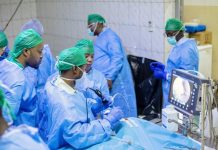Carl Mabuka
Africa-Press – Rwanda. Picture this: It is 5:17am and the hills are still dark. Claudine, a head nurse, walks into her health post. The generator makes a low sound. A few people are already waiting: someone with a cough, another with swollen feet, and a mother holding a sleepy child. Claudine works fast but calm. She takes blood pressure. She listens. She gives a kind word that helps more than any machine.
On another hill, Emmanuel, a community health worker, starts his walk. He carries a small bag with a thermometer, a pulse oximeter, and a notebook with visible rain marks. He will visit a woman with migraines and a child who stopped taking antibiotics.
In the lab, Aline carefully measures chemicals. She finds a way to run one more test, even when supplies are low.
This is how Rwanda cares for its people–discipline instead of abundance, purpose instead of show, partnership instead of pride.
When we say “AI,” many often think of a big office or a fancy dashboard. Think of something small that fits in Claudine’s pocket. Something that works even at midnight. Something that speaks Kinyarwanda. Something that suggests, then lets the nurse decide.
Back at the health post, Claudine opens an app on her phone. A patient has a cough, weight loss, and night sweats. The app says, “Check breathing rate.” It marks red when it is serious. In such places without many specialists, good advice arrives on a small screen. Triage is faster. Warning signs appear sooner.
Claudine receives a WhatsApp alert that on Wednesday, the X-ray truck will not come. Sending samples to town takes a whole day. So, Aline loads a chest X-ray into a tablet. The tool highlights signs of tuberculosis and asks for a second image. She taps “consult.” A clinician in Kigali agrees with the plan. The answer comes without a long, expensive trip. For mothers, the midwife uses a portable ultrasound. The tool shows how to angle, when to freeze, and what it means. Referrals happen when they are truly needed.
On Friday, the pharmacist is alerted by the app on her phone that they are running low on Amoxicillin and Oxytocin. The system has been learning, same time last year in the rainy season, and at the beginning of the school term there were surges in flu cases. It sends a forecast to the district store. A motorcycle arrives before the shelf is empty. This is not magic. It is logistics with better math.
What we learned at the health tech summit this year supports this plan. The message was clear: connected care toward universal health coverage. Systems must talk to each other so a patient record moves easily from the pharmacy to the clinic and to the ambulance without friction. Protect data and earn trust by getting clear consent and using models that are transparent.
AI is useful when it serves primary care and pharmacies, turning them into smart access points. And funding is shifting, less pilots, more scale with government as the main customer. Young Rwandan developers are building smart tools. Modest tools, built locally, are making a big difference.
AI will not lay fibre on our hills. We still need reliable power and devices that survive dust, drops, and rain. We still need training, good data rules, and clear responsibility. But Rwanda knows how to build step by step, with standards, and with trust. Our progress comes from the clinic and the village, not from slides that look impressive.
How do we move from promise to practice?
Start with the healthcare worker. Help Claudine feel less stress, make fewer mistakes, and have more time to listen.
Build for low network. The tech should work offline first and be capable of syncing later. This keeps it working when the signal drops behind a hill.
Protect patients. Get clear consent. Use models that people can check and improve.
Measure what matters. Track time to diagnosis, stock-out rates, and completed neonatal referrals. Not number of clicks.
Grow local skills. Keep knowledge, models, and infrastructure in Rwanda. Work with partners but keep control of health data.
If we do this right, AI in Rwanda will look modest at first but will soon come with faster triage, smarter stock, and earlier warnings.
To the health workers who carry us day and night, the purpose of AI is to carry part of your load. To the Ministry of Health and its partners, the path is the same path that built our progress; disciplined, ethical, practical, and focused on outcomes. To the public, embrace tools that respect you and make your care better, not just more digital.
Rwanda does not wait for perfect conditions. We move, carefully and together. Let’s make the next hospital fit in Claudine’s pocket.
Source: The New Times
For More News And Analysis About Rwanda Follow Africa-Press






